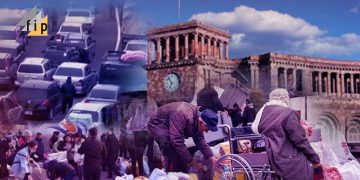Following the revolution, discussions over the Artshakh (Nagorno-Karabakh) conflict resolution have gained new momentum. One of the reasons was that Prime Minister Pashinyan’s statements were somewhat different from those of the previous authorities.
The discussions resumed especially after Nikol Pashinyan’s visit to the United States and his speech at the UN General Assembly. In this speech, as well as on various other occasions, Pashinyan stated that any resolution to the Nagorno Karabakh conflict should be acceptable to the peoples of Armenia, Artsakh and Azerbaijan.
“In order to go forward I was expecting a similar statement from Azerbaijan as well. However, the highest authorities of Azerbaijan remained in their position, seeking a resolution to the Nagorno-Karabakh conflict acceptable only to the people of Azerbaijan.
Although Pashinyan’s point of view was not new, and he had announced it earlier in 2018, nevertheless, the announcement again appeared in the spotlight of media and politicians. The views of the new government and the prime minister on the Artsakh issue were not left out of manipulations.
Fact Investigation Platform has studied Nikol Pashinyan’s various statements on the Artsakh issue, as well as the criticism and manipulations by political circles around them.
The right of Artsakh people to self-determination
Commenting on Pashinyan’s UN speech, Republican Eduard Sharmazanov particularly noted in an interview: “Pashinyan is not talking about self-determination, only about security,” he added. “Has any new Armenian government ever said that the self-determination of the people of Artsakh, ie the international recognition of Artsakh’s independence, has no alternative?”
Indeed, Nikol Pashinyan did not address Artsakh’s self-determination issue in his UN speech, but he has repeatedly spoken about the issue and the need for international recognition of Artsakh.
Thus, during a press conference in Stepanakert in May 2018 he noted: “… Concessions can only be made if we receive a very clear message from Azerbaijan that Baku is ready to recognize the right of the people of Artsakh to self-determination.”
Meanwhile, referring to his statement “Artshakh is Armenia and that’s it”, Pashinyan noted that the issue of reunification of Artsakh and Armenia can be discussed only after Artsakh’s international recognition.
“When the Republic of Artsakh becomes an internationally recognized state, the Republic of Armenia and the Republic of Artsakh will express their stance on the future of their people with the will of their peoples,” the Prime Minister stressed.
Pashinyan also spoke about this during a meeting with Bako Sahakyan. During the debate with the leaders of other political forces on the eve of the parliamentary elections, Pashinyan also stated that their main goal in the negotiations is to recognize Artsakh’s independence and ensure the security of the people.
During the question and answer session in the National Assembly, Nikol Pashinyan also spoke about the right of the people of Artsakh to self-determination, noting that Artsakh should exercise its right to self-determination.
“The principles within which the solution is to be resolved have been recorded within the framework of the OSCE Minsk Group, and it is important that the right of peoples to self-determination is established in these principles.”
Armenia a party to the conflict?
In a recent interview, Artsakh war hero Vitaly Balasanyan again referred to Pashinyan’s statement “Artsakh is Armenia and that’s it”, noting: “With the statement that Artsakh is Armenia and that’s it, [Pashinyan] has drawn Armenia into warfare. Armenia has never been a conflicting party or a party in a war. ”
Eduard Sharmazanov also repeated this view; “Pashinyan stated that Armenia is a party to the conflict and this is a shame. Armenia is not a party to the conflict, it is party to a ceasefire. “
Sharmazanov also expressed this view in 2018, stating that “in no international document is Armenia considered a party to the conflict, including the four prominent UN resolutions.”
Armenia, however, is de jure a party to the conflict. After Pashinyan’s statement, the first president Levon Ter-Petrosyan and Deputy Foreign Minister Shavarsh Kocharyan clarified the issue.
Levon Ter-Petrosyan, in particular, clarified that “Armenia, Azerbaijan and Karabakh have been granted the status of ‘party to the Karabakh conflict’ by the international community in the final decision of the Budapest Summit on December 6, 1994 and, more specifically, in Clarification of OSCE Chairman-in-Office in Prague on March 31, 1995.”
Meanwhile, Shavarsh Kocharyan noted that Armenia is a party drawn into the Karabakh conflict, whereas the main parties to the conflict are Artsakh and Azerbaijan.
Ani Avetisyan

 FACTOMETER
FACTOMETER









